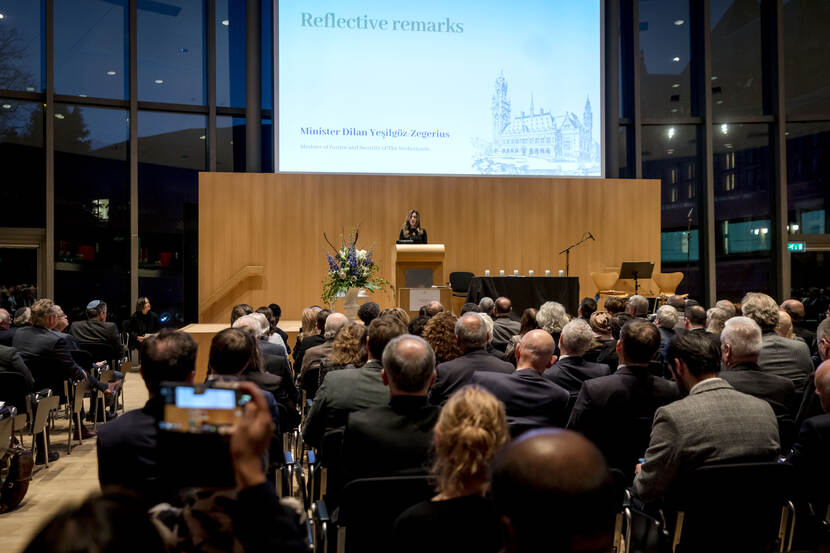Toespraak minister Yeşilgöz-Zegerius bij International Holocaust Remembrance Day
Toespraak van minister Yeşilgöz-Zegerius (JenV) op 30 januari 2023 bij International Holocaust Remembrance Day in Den Haag. De tekst is alleen in het Engels beschikbaar.

Your Excellency, Professor Bilsky, Ms Maarsen-Laufer, ladies and gentlemen,
Thank you for inviting me to be here at this event commemorating the horrors of the Shoah. This event today has made a deep impression on me.
The stories shared here cut right to the bone. They underline the importance of such accounts, of victims’ testimonies, and of documenting them for posterity.
Here, in the country of Anne Frank and Etty Hillesum, we understand the value of those stories. At the same time, we have to decide which stories, which testimonies and which images we store in our collective memory.
That is a big challenge in a time when everyone has their own mass media channels and when fake news is more rampant than ever. Professor Bilsky’s lecture examined the importance of eye-witness accounts, and how they are interpreted by law. After all, ‘the’ truth can consist of many different truths, and we must always be alert to the danger of malicious actors trying to control the narrative.
Just after the camps were liberated, General (and later President) Eisenhower instructed the army to film and document everything. For the horrors were so terrible that people in the future might not believe – and perhaps could even deny – that they ever took place.
I fear we might have now arrived at that point. The phenomenon is visible, the trend is clear. There is a grievous lack of knowledge about the Holocaust in our country.
Many young people think the atrocities were greatly exaggerated. Others don’t believe they happened at all. Soon there will be a generation that has never heard the warnings of the Holocaust.
Not simply because they weren’t properly educated about it, but also because ‘alternative facts’ fit better with their worldview, regardless of whether that view is fuelled by far-right, far-left or religious ideology. This concerns me greatly.
Because the lesson of the Holocaust is not a history lesson. It also has something to teach us about the here and now. About discrimination, exclusion and, ultimately, extermination.
About humanity and compassion. About good and evil, and speaking out when you see the former changing into the latter.
Anti-Semitism may be as old as Judaism itself, but the horrors of the Holocaust are less than a 100 years old. Many of us know people who experienced it. A grandfather, a great grandmother or a neighbour, who can still tell us their stories.
People like Ms. Maarsen-Laufer. And they are worried about the future: who will tell their stories once they are gone? Who will visit the schools, confront the ignorant, and challenge the deniers who cast doubt on the horrors of the Shoah?
Fortunately, these survivors are still around, but they won’t be here forever. That’s why it’s crucial for their stories to be passed on to the next generation. And the next. The Dutch government is working to facilitate that process.
At the same time, anti-Semitism and exclusion of Jewish people is still going on every day. Fuelled by conspiracy theories, social media and – yes – politicians too.
Jews are insulted, mistreated and scapegoated. In Europe, the rise in incidents involving discrimination and violence is evidently clear.
Jews are taunted on social media. They are the targets of gossip at universities. Their schools and synagogues require security.
The individual stories I hear from young Jewish people are downright shocking. Many are considering leaving the Netherlands and Europe altogether. I personally know people who, when planning a bar mitzvah, felt they had to arrange for security before they sent out the invitations. That is appalling.
Here, again, our society seems to have forgotten the most important lessons of the Holocaust.
Today, as the images, testimonies and memories of the Holocaust slowly fade, the task falls to us, the next generations. It is up to us all – not only Jews, but also and especially non-Jews – to keep this history alive. To make sure that we remain vigilant. To speak out.
Against that background, I’m pleased that numerous European special envoys and coordinators on combating anti-Semitism joined together last year and issued the Vienna Declaration. Tackling anti-Semitism has a clear place on the European political agenda, and the member states are also pursuing their own approaches. In education, the media, politics and the justice system.
In the Netherlands, for example, we’re working to criminalise Holocaust denial. It is shocking that this should even be necessary. But with anti-Semitism raising its ugly head at every turn, it’s something we can’t ignore. We must not allow the truth to be obscured by the war of narratives.
‘Never again,’ we once said, though perhaps we should have known better. The stories and images speak for themselves, but increasingly they exist only on yellowing paper and fading celluloid.
Now that the survivors are less able to keep telling their stories, let us do it for them. Not with caution and hesitation, but with confidence and conviction. History compels us to do so, and I thank you all for your tireless dedication to that cause.
Thank you.